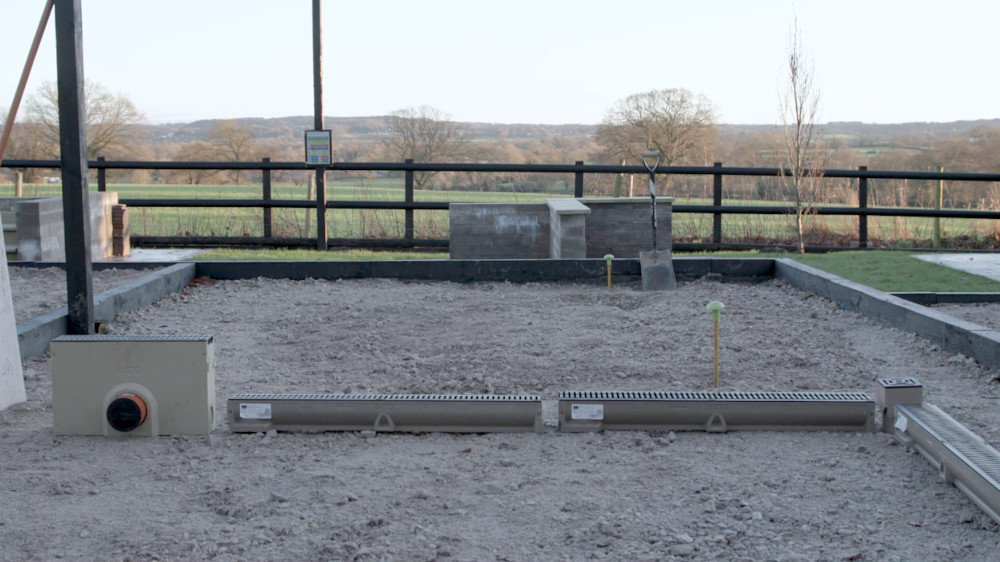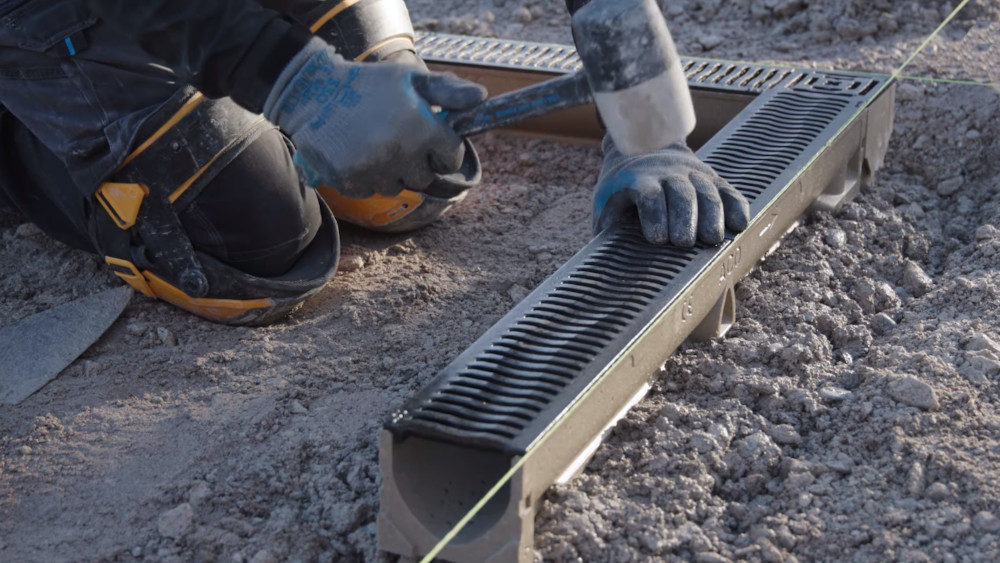Driveways and parking areas are vital components of a property, providing accessible, safe, and practical spaces for vehicles. In New Zealand, where heavy rains and fluctuating weather conditions are common, proper drainage in these areas is essential. Effective drainage systems prevent water buildup, reduce erosion, and extend the lifespan of your driveway or parking area, ultimately saving you from costly repairs. In this post, we’ll explore the importance of driveway drainage, the potential problems caused by poor drainage, types of drainage systems, and how to choose the right solution for New Zealand’s unique climate and landscape.
The Importance of Driveway Drainage
Water may seem harmless, but when it collects on driveways and parking areas, it can cause extensive damage. Without a proper drainage system, rainwater can pool and seep into the ground, causing erosion, surface cracking, and even structural damage to nearby buildings. By installing a suitable drainage solution, you can avoid these risks and protect the value of your property.
In New Zealand, where properties often contend with varied terrain, high rainfall, and proximity to coastlines, proper drainage systems are even more critical. Drainage systems help redirect water away from your driveway and parking area, ensuring that rainwater and runoff do not disrupt your property or the surrounding environment.
Potential Problems from Poor Driveway Drainage
Poor drainage can cause several problems for driveways and parking areas, many of which can escalate quickly if left unaddressed. Here are some of the most common issues that can arise from inadequate drainage:
- Water Pooling
Standing water on a driveway is more than just an eyesore; it can become a safety hazard. Pooled water can turn into ice during winter, making driveways and parking areas slippery and dangerous. Over time, stagnant water can also lead to deterioration of surface materials, especially if they’re porous.
- Surface Erosion and Potholes
Without adequate drainage, water can wash away the soil and gravel beneath your driveway or parking area, leading to erosion. This weakens the structure, eventually causing cracks and potholes. In extreme cases, the lack of a solid foundation can make the entire surface unstable, requiring extensive repairs.
- Cracking and Heaving
Water trapped beneath the driveway’s surface can expand and contract with temperature changes, causing cracks and heaving. Over time, this can lead to unsightly damage and increase the need for costly repairs or replacement.
- Damage to Adjacent Structures
Poor drainage doesn’t just affect driveways and parking areas; it can also impact nearby structures. Excess water may seep into the foundation of nearby buildings, causing mold, mildew, and structural damage. Driveway drainage systems can help prevent water from reaching these areas.
- Environmental Impact
Inadequate drainage can lead to erosion and runoff issues that negatively impact surrounding soil, vegetation, and waterways. Implementing a proper drainage system helps minimize the environmental impact of your property’s hard surfaces, contributing to better stormwater management in your community.

Types of Driveway Drainage Solutions
There are several drainage solutions available for driveways and parking areas. Choosing the right system depends on factors like the size of the area, the type of surface material, and the slope of the landscape. Here are some of the most common types of driveway drainage systems used in New Zealand:
- Surface Drains
Surface drains, such as channel or trench drains, are installed along the edge of the driveway or parking area to capture surface water. These drains are ideal for paved driveways and can handle large volumes of water, directing it into a drainage system or away from the property. Grated channels are commonly used in residential driveways as they blend well with the surface while effectively removing water.
- French Drains
French drains are subsurface drainage systems that consist of a gravel-filled trench with a perforated pipe. They are particularly useful for gravel or stone driveways where surface drains might not be practical. French drains help move water away from the surface and into a designated drainage area, preventing pooling and erosion.
- Permeable Driveway Materials
Permeable driveway materials, such as porous concrete, asphalt, or permeable pavers, allow water to pass through the surface, reducing runoff and pooling. These materials are especially effective in flat areas with high rainfall, as they enable water to flow naturally into the soil below.
- Swales
Swales are shallow, vegetated channels that guide water away from driveways and other surfaces. Swales are effective in large properties or areas with significant slopes. By allowing water to naturally flow along a designated path, swales prevent erosion and support groundwater recharge.
- Dry Wells
Dry wells are underground storage systems that collect water from surface drains, allowing it to percolate slowly into the soil. These are useful in areas with limited space for traditional drainage systems and are often used in conjunction with surface or French drains for added capacity.
Choosing the Right Drainage System for New Zealand Conditions
Selecting the best drainage system depends on the unique characteristics of your property and New Zealand’s varied climate. Here are some considerations for choosing the right system:
- Climate and Rainfall: New Zealand’s climate varies significantly by region, with high rainfall on the West Coast and drier conditions in the east. Choose a drainage system that can handle the intensity and frequency of local rain.
- Soil Type: The permeability of your soil affects how well it absorbs water. In areas with heavy clay soils, subsurface drains and permeable materials may be more effective, as clay retains water and prevents drainage.
- Slope and Elevation: Sloped driveways require more robust drainage solutions like French drains or channel drains to guide water away effectively. Flat driveways can benefit from permeable materials that allow water to seep into the ground.
- Environmental Considerations: Choose systems that minimize environmental impact by managing runoff and supporting groundwater replenishment. Sustainable drainage solutions help protect New Zealand’s landscapes and waterways.

Steps to Maintain Your Driveway Drainage System
A well-maintained drainage system can significantly extend the lifespan of your driveway or parking area. Here are some tips for keeping your system in top shape:
- Regularly Clear Debris
Leaves, dirt, and debris can block drains, reducing their effectiveness. Make it a habit to clean out surface drains, swales, and grates, especially after heavy rain or during seasonal changes.
- Inspect for Clogs and Damage
Inspect your drainage system regularly for signs of clogs, cracks, or damage. Addressing these issues early can prevent more extensive damage.
- Adjust Grading and Slope if Needed
Over time, erosion or shifting soil can alter the grading around your driveway. Ensure the slope continues to direct water toward drains or runoff areas.
- Check Permeable Materials for Wear
If you’ve installed a permeable driveway, check for areas that may need replenishing or replacement. Adding fresh aggregate or replacing worn pavers can help maintain effective drainage.
- Maintain Vegetated Areas
For drainage systems that include swales or plantings, ensure vegetation is healthy and trimmed. This supports soil stability and encourages proper water flow.
Benefits of Professional Drainage Installation
While DIY drainage systems are possible, professional installation offers long-term value and peace of mind. Certified drainage experts understand the complexities of New Zealand’s climate and soil, ensuring a system that effectively meets your property’s needs. Professional installation also reduces the risk of future repairs and ensures compliance with local regulations.
Conclusion
Proper drainage is essential for protecting driveways and parking areas from water damage and erosion. Whether your property faces heavy rains, seasonal flooding, or challenging slopes, investing in a suitable drainage system can help maintain the integrity and functionality of your driveway for years to come. From surface drains to French drains and permeable materials, there’s a solution that will work for every New Zealand property.
Protect Your Driveway with Real Drainlayers
At Real Drainlayers, we specialize in effective and durable drainage solutions tailored to New Zealand’s unique conditions. Contact us today for a consultation and let us help you find the right drainage system for your driveway or parking area. Safeguard your property with a professionally installed drainage system from Real Drainlayers.

